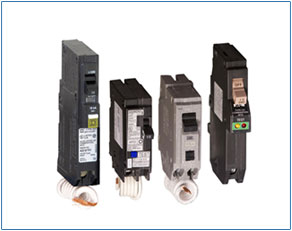By Keith Waters, PE, CEM, Schneider Electric USA and National Electrical Manufacturers Association Low Voltage Distribution Equipment Section Arc Fault Circuit Interrupter Task Force
Safety has always been a top priority in new home building and construction over the years, and electrical industry professionals have worked hard to do their part in protecting property owners. As the nation has increased its electrical use, new requirements continue to be added to the National Electrical Code (NEC®) including the installation of surge protection throughout all new residential and commercial buildings.
Equally important in helping prevent electrical fires are arc fault circuit interrupters (AFCIs) that detect dangerous arcing in damaged wiring and quickly shut down power to the impacted area, helping stop a fire before it can start. Combined with other technologies and fire protection construction materials, the NEC® AFCI requirements have been around for 22 years now and have helped contribute to a significant reduction in electrical fires from 75,000 per year in the 1980s down to 25,000 most recently, according to the U.S. Fire Administration. On average, injuries from electrical residential fires have also dropped by 20 percent and deaths by 15 percent.
Electricians, electrical contractors, and other electrical industry professionals adhering to the current edition of the NEC® know how critical these devices can be when it comes to safety. Statistics and facts back that up, dispelling any myths as shown in the examples below.
Cost
Myth: AFCI circuit breakers required in new home construction can cost $3,000+ per home, making them unaffordable.
Fact: The average cost for an AFCI circuit breaker is $38 (according to a NEMA blind survey for 2017 HUD Manufactured Housing Construction Safety Standards), or approximately $300 to protect a new 2,000-square-foot, four-bedroom home from electrical fires caused by electrical arcing. That’s about 83 cents per month to protect a family from electrical fires over a 30-year mortgage. In contrast, material and hefty labor costs associated with installing an upgrade like granite countertops averages around $4,500, or $12.50 per month over the same period.
Appliance Compatibility
Myth: AFCI circuit breakers are not compatible with common household appliances. 
Fact: AFCI circuit breakers work extremely well with new appliances that meet U.S. product safety standards. AFCIs currently are protecting branch circuits feeding tens of millions of motors without issue. This number grows annually as more and more homes are built utilizing AFCIs. Some older appliances may incorporate components that predate current product safety standards or have operational characteristics that are not compatible with AFCI protection. Counterfeit appliances or those not certified by a nationally recognized testing laboratory (NRTL) also may be incompatible with AFCI circuit breakers.
Product Availability
Myth: AFCI circuit breakers are hard to find.
Fact: Several companies manufacture AFCI circuit breakers for electricians and consumers. AFCI circuit breakers can be purchased at electrical supply houses, home improvement stores, and online.
AFCI Lifespan
Myth: AFCI circuit breakers only last one year or need frequent replacement.
Fact: AFCI circuit breakers are tested and certified to extremely rigorous U.S. product safety standards. When installed correctly, AFCI circuit breakers are expected to last the life of a standard circuit breaker under normal operating conditions. AFCI circuit breakers also carry a manufacturer’s warranty.
The National Fire Protection Association (NFPA) recommends AFCI use in all dwellings. AFCIs also work well with new appliances that meet UL standards and there have been no documented fires on AFCI protected circuits. Based on similar facts, Massachusetts recently required all 15- 20A branch circuits in new home building to be fully protected by AFCIs on January 1, 2020. To find out more about AFCIs, please visit www.AFCISafety.org, Facebook, and LinkedIn.


